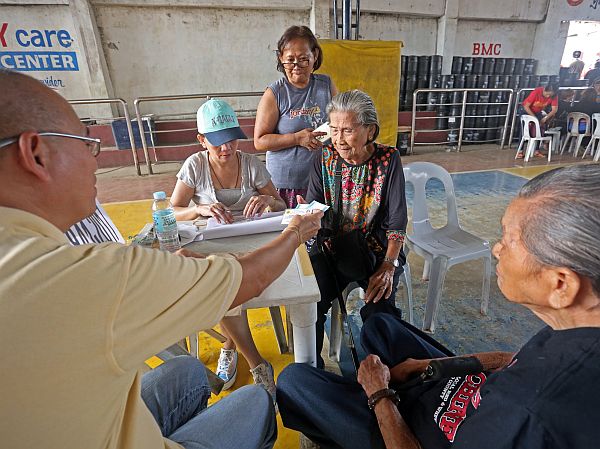
A senior citizen couple receives their financial aid in Barangay Mabolo in this 2017 file photo.
CEBU CITY, Philippines — An infectious disease expert in Cebu City is urging the city government to not allow the senior citizens to freely go out yet until the city has polished its monitoring and surveillance on the coronavirus disease 2019 (COVID-19) spread.
Dr. Bryan Lim said he understood the loneliness and anguish of senior citizens being cooped up in their homes for more than six months, but the risk of them contracting the disease and developing its severe form was still high.
Of the 10,000 positive cases in Cebu City, 15.24 percent of the cases are 60 years old and above, and they accounted for 57.41 percent of total deaths.
Look: Here is the breakdown by age group of the COVID-19 death rate in Cebu City
Read: Labella: We need to keep senior citizens safe at home
The Emergency Operations Center (EOC) said older people faced a very significant risk of developing severe illness if they contracted the disease due to physiological changes that come with aging and potential underlying health conditions.
For one, Lim said there was still a significant gap between the workplace standards set by the Department of Trade and Industries (DTI) and the actual implementation of these health protocols by the establishments.
With almost 80,000 establishments in Cebu City based on the data of the Business Processing and Licensing Office (BPLO), the city government struggles to monitor all these establishments for their implementation of health protocols.
This is why trained health and infection prevention control officers (HIPCO) should be present per establishment, to monitor safety standards.
“Maulaw man gud usahay mobadlong atong mga establishment. Dapat dili ta maulaw mobadlong because that is for our safety. (The establishments shy away from reprimanding customers. We should not be scared because that is for our safety),” said Lim.
For the city’s part, he said there should be random checks and audits by the government to ensure that establishments follow the rules while doing this fairly by working with the private sector to level expectations.
The cooperation of the private industries is crucial because self-regulation is the key to a safer city.
Read: EOC defends stay-at-home order for senior citizens: We’re keeping them safe
He suggested different classifications of safety that might be tagged on an establishment allowing only certain establishments with a high safety rating to accommodate senior citizens.
“We should identify areas and endorse companies that comply with safety standards,” said Lim.
The city should also provide surgical masks for the elderly because cloth masks are not enough to protect the most vulnerable age group.
He said it might be expensive, but it would still be cheaper than the money families would have to spend if the senior citizen in facts would develop the COVID-19.
“Before we allow the seniors to go out, we should be ready and monitor the areas that are frequently visited by the elderly like the market, church, coffee shops, groceries. Remember, although the elderly does not comprise the majority of the cases, they comprise roughly 60 percent of the mortalities. So we need to minimize their risk as much as possible,” added Lim.
Lim said that only when the city had fully prepared its public places, establishments, and most frequented places should they allow the senior citizens to go out.
Even then, he said the city would still need to continuously monitor the rise and fall of COVID-19 cases to predict the spread and conduct the necessary interventions. /dbs